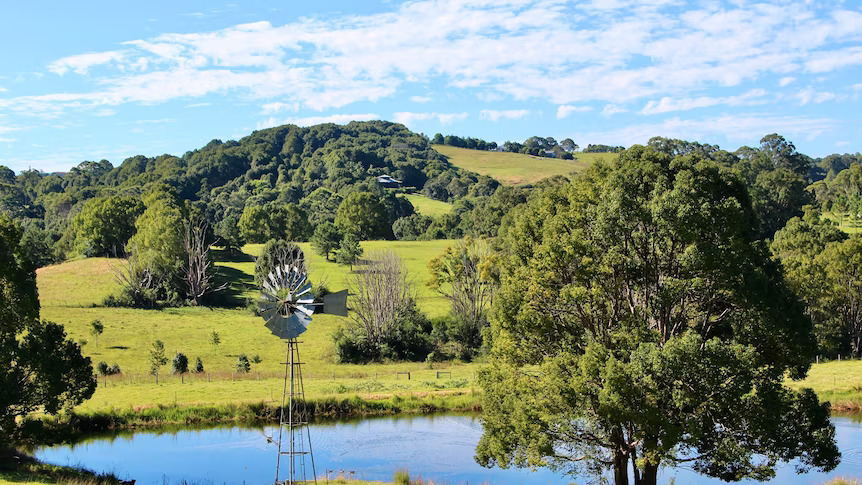Original publication by Lisa O’Carroll, Jennifer Rankin, Jon Henley, Rory Carroll, Philip Oltermann and Sam Jones for theguardian.com on 18 October 2022
Governments across the continent have announced a range of measures to tackle any energy shortages this winter
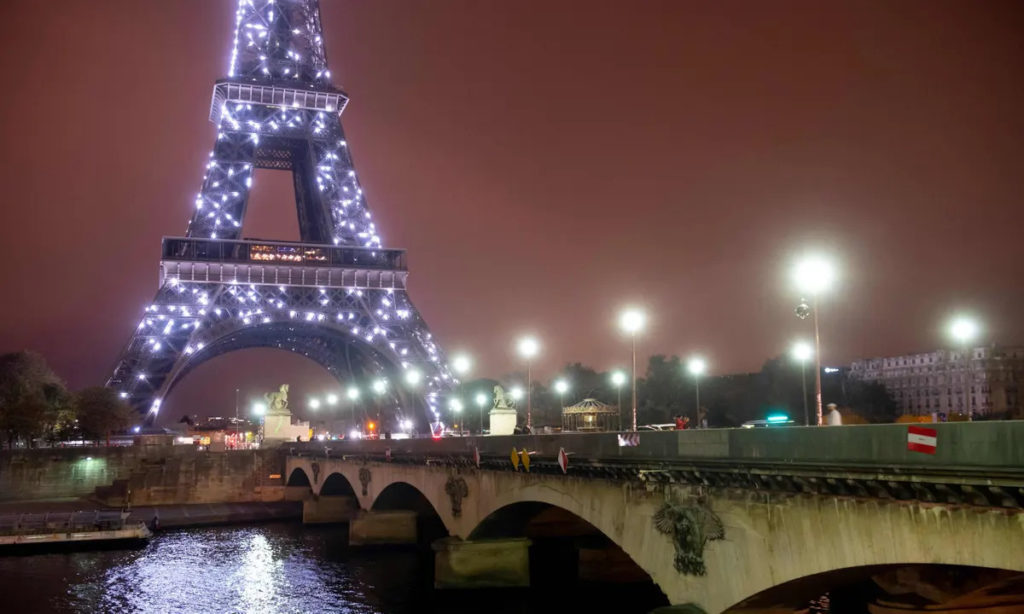
Photograph: Saul Loeb/AFP/Getty Images
Paris is switching off the Eiffel Tower lights an hour early, Milan has turned off public fountains, and Hanover is offering gym users cold rather than hot showers in an effort to combat potential energy shortages this winter.
At the same time, the public are being encouraged to do their bit by avoiding using household appliances between 4pm and 7pm, stock up on blankets and slow down their driving.
One global retail chain is encouraging staff to change their behaviours: to use stairs instead of lifts, to use energy-saving apps at home, and unplug devices rather than leaving them on standby.
The UK, by contrast, has blocked a £15m campaign encouraging the public to conserve energy, with the government arguing that the country is “not a nanny state”.
But across Europe, governments and municipal authorities have responded to calls to reduce power consumption and reach an EU target of shaving 15% off energy consumption by next March.
All member states are reducing heating in public buildings by one degree to 19C, but some have gone further.
France

Photograph: Stéphane Cardinale/Corbis/Getty Images
The Eiffel Tower lights are being turned off more than an hour early, shaving 4% off energy costs as the city responds to the government call to reduce fuel usage.
The government has also launched a major communication campaign, “Every gesture counts”, encouraging individuals and industry to do their bit.
Luxury goods conglomerate LVMH, which owns more than 500 stores including brands such as Christian Dior, Givenchy and Tiffany, and supermarket chains LeClerc and Carrefour are turning the lights off in their shops three hours early.
Workers are also being encouraged into “new energy consumption behaviours” such as using stairs instead of lifts, not using printers, and unplugging computers and electric cars.
At home, people are being asked to keep the heating at 19C or lower in living rooms and kitchens (17C in bedrooms), drop boiler temperatures to 55C, use energy-intensive appliances such as dishwashers and washing machines during off-peak hours, and turn standby mode on devices including TVs and wifi routers off when not being used. Households that do so will be rewarded with a “sobriety bonus” (details to be announced), as will commuters who join a car pool.
Public building managers have been told to switch to LED bulbs, turn off hot water boilers unless they are essential, and not heat offices above 19C.
Sports complexes must lower their heating by two degrees and public swimming pools their water temperature by one degree, while street lights and signage will be dialled down in intensity, switched on for shorter periods, and where possible switched off altogether between 1am and 6am.
Companies and public sector employers have been instructed to organise home working so that their premises can be closed altogether for three or four days at a time, and people with cars provided by public sector employers must limit their speed.
Owners of private buildings are encouraged to reduce thermostats to 19C while occupied and lower them further to 16C overnight and 8C if they are not occupied for more than two days, as on bank holiday weekends.
Ukraine
Ukraine is not just fighting a war against Russia, but an energy crisis in one of the coldest countries in Europe.
While the EU drops its thermostats to 19C, Ukraine’s authorities are talking about reducing central heating in building to four degrees lower than normal, between 17C and 18C.
People have been advised to stock up on blankets and warm clothes for when outdoor temperatures fall to and below the -10C winter average.
Spain

Photograph: Juan Medina/Reuters
Under a government decree, temperatures can be set no higher than 19C in public buildings.
The new rules do not apply to households, but people are being encouraged to follow suit.
Shops must also switch off window display lighting from 10pm and any air-conditioned or heated premises must have an automatic door-closing mechanism installed to avoid energy waste.
Spain, which is not as dependent on Russian energy supplies as many other EU countries, has agreed to a 7%-8% reduction in gas use in solidarity with other EU countries.
The measures will remain in place until November next year.
Belgium
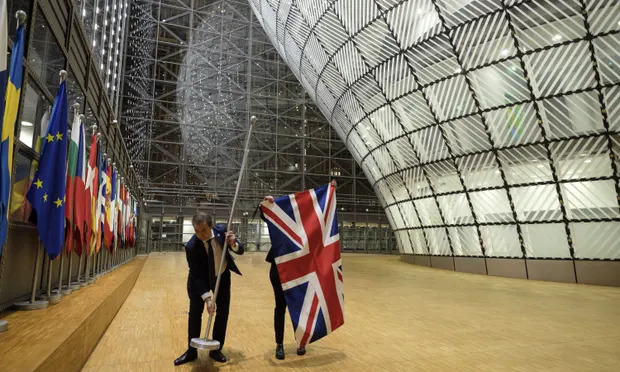
Photograph: Thierry Monasse/Getty Images
Staff have been told not to grumble after the thermostat at the EU council of ministers HQ and Europa building, the site of EU summits, was reduced to 19C.
“Compensating for the lower thermostat setting by bringing in individual electrical heaters is obviously out of the question,” says an internal memo that advises staff to “consider coming to work with an extra sweater” and not hesitate to wear it because “energy matters more than our traditional dress code”.
The Europa lantern – the internal oval-shaped structure in the Council HQ known as the space egg – will be turned off, while the vast atrium will be switched to a chilly 14C.
MEPs have also reopened their longstanding campaign against the European parliament’s monthly commute to Strasbourg.
The German Christian Democrat MEP Peter Liese has called on parliamentary authorities to abandon the Strasbourg trip until April, because “if we ask everyone to save energy, it is not responsible to heat two buildings and make unnecessary trips”.
Ireland
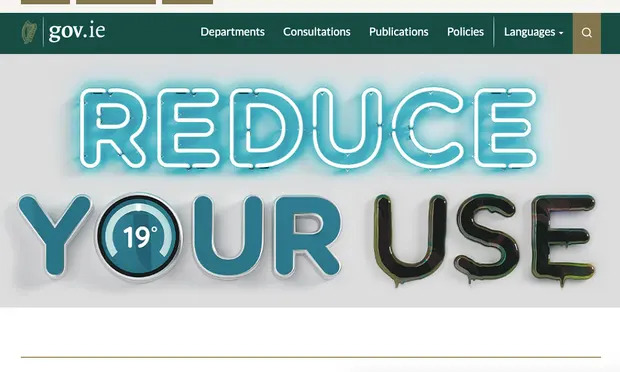
Photograph: Irish government
A “reduce your use” government campaign is urging the public to use cookers, tumbledryers, washing machines and kettles efficiently and, where possible, outside peak hours of 4pm to 7pm.
The government of the car-dependent country is also asking motorists to drive more slowly, maintain tyre pressure, and drive smoothly to conserve energy consumption. It is also encouraging them to switch one journey a week to walking, cycling or public transport.
Ireland delayed switching on heating at the Dáil. In September several members of parliament complained about the cold, but the staff who run the complex said they wished to set an example.
In an email, managers said the heating would not be turned on until 3 October at the earliest. After four days of setting an example, the heating was switched on.
Germany
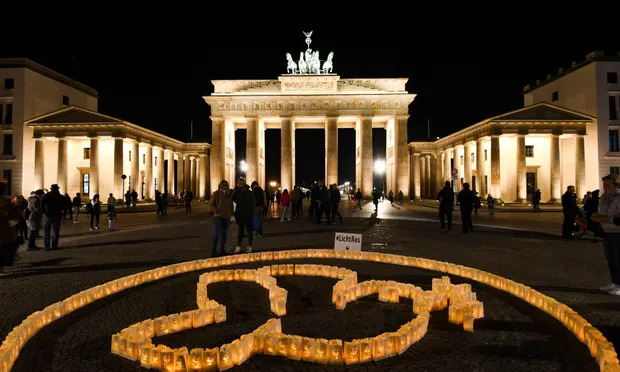
Photograph: Annegret Hilse/Reuters
Public monuments, including the Brandenburg Gate in Berlin, public buildings and advertising billboards can only be illuminated between 4pm and 10 pm, except during cultural festivals.
An annual light show festival in Berlin went ahead this week, but the organisers said they had managed to reduce the consumption of electricity by 75% compared with last year.
Heating in corridors in public buildings will be switched off. The maximum temperature in public administration offices is 19C. There is no binding maximum temperature for homes, but privately owned swimming pools must no longer be heated with electricity or gas unless “urgently necessary for therapeutic use or to avoid damages to the pool technology”.
Temperatures at public pools have also been lowered. Some municipalities have gone further and turned off instant hot water.
Hanover said hot water would not be available for handwashing or showers in public buildings, swimming pool showers, sport halls and gyms.
Italy
Operation Thermostat this spring already led to a number of energy-saving measures, including the switching-off of public fountains.
The Italian government is asking homeowners to turn central heating down by 1C and to turn it off for an extra hour every day.
It is also encouraging people to take shorter showers, to use dishwashers and washing machines only when fully loaded, and not to leave home appliances on standby.
Netherlands
The Dutch government is advising households and business on measures to cut consumption, including turning down heating by 1C.


